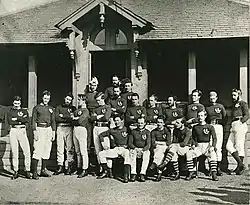 | |||||||||||||||||||||||||||||||||||||||||||||||||||||
| Birth name | William Cross | ||||||||||||||||||||||||||||||||||||||||||||||||||||
|---|---|---|---|---|---|---|---|---|---|---|---|---|---|---|---|---|---|---|---|---|---|---|---|---|---|---|---|---|---|---|---|---|---|---|---|---|---|---|---|---|---|---|---|---|---|---|---|---|---|---|---|---|---|
| Date of birth | 10 September 1850[1] | ||||||||||||||||||||||||||||||||||||||||||||||||||||
| Place of birth | Glasgow | ||||||||||||||||||||||||||||||||||||||||||||||||||||
| Date of death | October 16, 1890 (aged 40)[1] | ||||||||||||||||||||||||||||||||||||||||||||||||||||
| Place of death | Bournemouth, England[1] | ||||||||||||||||||||||||||||||||||||||||||||||||||||
| Notable relative(s) | Malcolm Cross, brother | ||||||||||||||||||||||||||||||||||||||||||||||||||||
| Rugby union career | |||||||||||||||||||||||||||||||||||||||||||||||||||||
| |||||||||||||||||||||||||||||||||||||||||||||||||||||
| 10th President of the Scottish Rugby Union | |||||||||||||||||||||||||||||||||||||||||||||||||||||
| In office 1882–1883 | |||||||||||||||||||||||||||||||||||||||||||||||||||||
| Preceded by | Alexander Petrie | ||||||||||||||||||||||||||||||||||||||||||||||||||||
| Succeeded by | Gussie Graham | ||||||||||||||||||||||||||||||||||||||||||||||||||||
William Cross (10 September 1850 - 16 October 1890)[1] was a Scotland international rugby union player.
He is notable for scoring the first conversion in international rugby in 1871 in the match between Scotland and England, after Angus Buchanan scored a pushover try, and he also Scotland's second ever try later in the match.
Rugby Union career
Amateur career
Cross played for Glasgow Academicals, and Merchistonians.[2][3]
Provincial career
He played in the world's first provincial district match in 1872; the 'inter-city' - a match between Glasgow District and Edinburgh District. Cross played for Glasgow as a half-back.[4]
International career
Cross was one of the first international half-backs, along with J.W. Arthur and their English counterparts.[2][3]

Cross represented Scotland in 1871 in the first international match. Of the Scottish score, one of the English players wrote: "after a maul, just outside the English goal-line the umpires ordered the ball to be put down in the scrummage five yards outside the line. It was taken was out accordingly, but, instead of putting it down, the Scottish forwards drove the entire scrummage into goal, and then grounded the ball and claimed a try. This, though illegal according to English laws, was allowed by the umpires and the goal was kicked by Cross."[5]
At the time, conversions and goals, not tries produced a score, so in fact Cross, not Buchanan was the first to put points on the board.[2] In fact, this was the only score in the match.[6]
Cross rounded off the game with a second try, ninety seconds before the final whistle, when with their forwards running riot, J.W. Arthur knocked on from a line-out and the ball looped over the English defenders, with the quick thinking Cross picking it up for Scotland's second try.[2]
He played one more international in 1872.[7]
Referee career
After his international playing career was over, Cross became Scotland's second international rugby referee when he officiated an early encounter between Scotland and England. This was his only international game as a referee.[8]
He refereed the 1882 inter-city match between Glasgow District and Edinburgh District.[9]
Administrative career
Cross took up a role within the Scottish Rugby Union and he continued promoting Scottish rugby, becoming President of the Scottish Rugby Union for the 1882–83 season.[8]
Family
His brother Malcolm Cross gained nine caps for Scotland.[7]
References
- 1 2 3 4 William Cross international rugby profile Scrum.com
- 1 2 3 4 Bath, pp 4,5
- 1 2 Massie, p5
- ↑ "The Glasgow Herald - Google News Archive Search". news.google.com.
- ↑ Massie, p6
- ↑ Bath, p37
- 1 2 Bath, p136
- 1 2 Thorburn, A.M.C. (1985). The Scottish Rugby Union, Official History. Scottish Rugby Union and Collins Publishers. p. 100. ISBN 0-00-435697-7.
- ↑ "Register". Retrieved 16 March 2023 – via British Newspaper Archive.